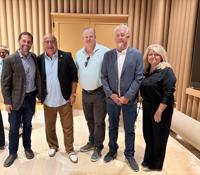Rep. Jason Crow joined 16 Littleton business owners for a discussion about what challenges the entrepreneurs face on Aug. 25 at Kiln
Rep. Jason Crow met with Littleton business owners at Kiln on Aug. 25 for a roundtable discussion centered on the various challenges faced by local businesses, from funding shortages to safety issues.
“We’re in an environment of severe change that is sending shockwaves through a lot of different industries,” Crow said.
Joining Crow at the discussion were community leaders and entrepreneurs who shared insights into the daily struggles of business ownership in the current climate.
“People are terrified right now. I mean, they’re afraid to go to work, they’re afraid to go to take their kids to school,” said Susan Thornton, founder and co-chair of Immigrant Pathways Colorado, a nonprofit that offers financial assistance to documented immigrants looking to apply for citizenship, learn English and develop their professional skills. Thornton is also the founder and chair of the South Metro Community Foundation.
Eric Hyatt, a restaurant owner on Main Street in downtown Littleton, said he is seeing the impact of national politics on his staff’s morale.
“From talking with other restaurant owners, they all share the same concern that their employees are scared to come to work,” he said.
Chérie Garcia-Kuper, the assistant secretary for Littleton Public School’s Board of Education (LPS), co-chair for the Latino Business Committee within the Littleton Business Chamber and owner of two companies, also shared similar sentiments.
“I’m the first person of color elected to the school board,” she said. “I’m the person these families contact and say, ‘What do we do? We’re afraid. What if (ICE) comes into their school?’”
Crow stated his opposition to President Donald Trump administration’s approach to immigration reform, sharing the business owners’ concerns for their employees and clients.
“I believe we do need to have a secure border, we need comprehensive immigration reform, but mass deportation is not the right way to solve that,” he said. “These are our friends, our neighbors, our workforce, and this is the wrong response.”
Crow said immigration enforcement is planning to make the now-shuttered Hudson Correctional Facility into another detention center. Highlands REIT, a real estate investment trust based in Chicago, proposed that the prison could be used as an immigration detention center for ICE, according to documents obtained by the American Civil Liberties Union.
When the conversation shifted to worry over rising costs to keep people employed, Hyatt said he doesn’t just want to pay his staff a livable wage; he wants them to have more than enough money to pay the bills. Yet, labor expenses stretch his wallet thin.
“(People ask), ‘Why don’t you just pay (your servers) more money?’ Because then your burger is going to be $35. These are the kinds of things that we deal with when it comes to labor,” he said.
In her business that specializes in kitchen, bath, cabinetry, and construction design, Cherie Garcia Design, Garcia-Kuper said she prides herself on being able to offer healthcare benefits to her employees — something she is no longer able to do.
“I went from about 15 employees to three,” she said. “When people aren’t buying houses, I’m not designing their kitchens, bathrooms and cabinetry because it’s a luxury… So this economy has affected my life deeply.”
Garcia-Kuper and Hyatt said when people aren’t spending money on local businesses, keeping the businesses open is nothing short of a challenge.
“We don’t want our staff to just make ends meet; we want them to thrive,” Hyatt said.

From left, Rep. Jason Crow, Kal Murib, Drew Lang, Pat Dunahay and Korri Lundock
Pat Dunahay, Littleton Business Chamber’s co-president and executive founding board member, said a rise in property taxes has become strenuous on local businesses.
“My little radio shop pays more in property taxes than it does in rent,” he said.
Dunahay owns PDA Road Gear, a car audio and accessories shop in Littleton.
Garcia-Kuper added another layer to the conversation and said LPS receives funding through property taxes, with additional state funding from Colorado to cover any shortfalls.
“The more property tax we collect, the less the state gives us,” she said.
Dunahay said he believes that those who own property in Littleton but may not be residents also deserve the right to vote in Littleton elections.
“I think that businesses should have a say in this because they’re paying for it. Business should always be considered,” he said.
Crow said there are multiple parts to his job — legislating and advocating.
“I remain one of the most bipartisan members of Congress… I will continue doing that,” he said. “Another piece of my job is using my megaphone as much as possible and pushing back on the rhetoric and mis- and disinformation by being very clear about what is happening right now.”













